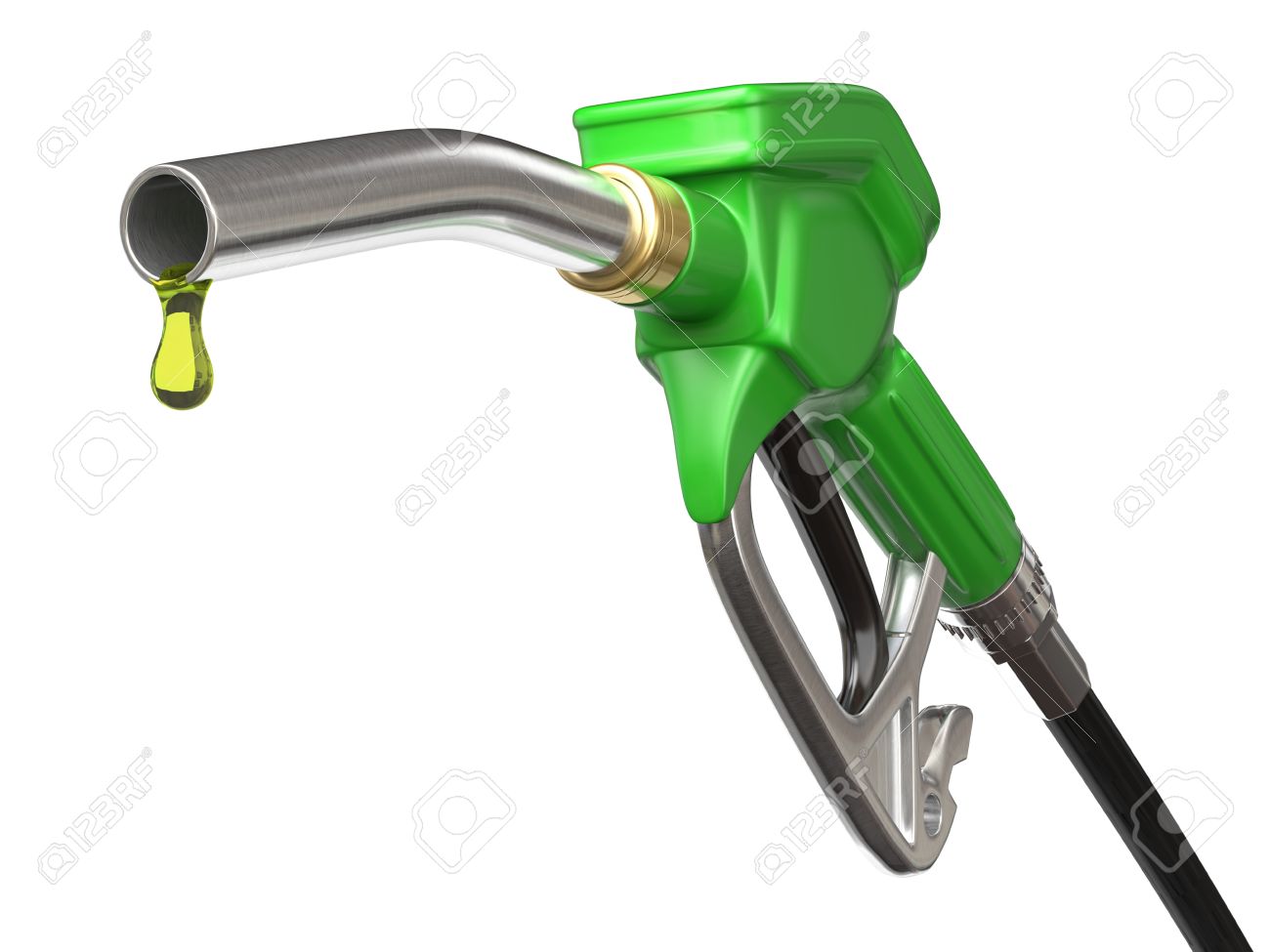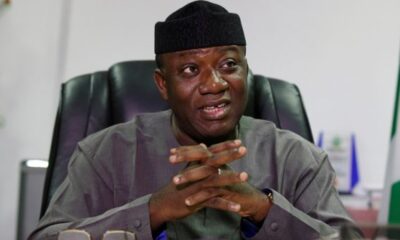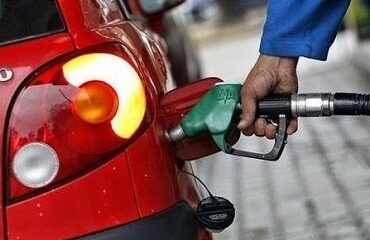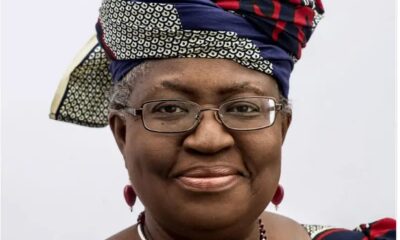Business
Fresh Fuel Price Hike Looms As Landing Cost Rises By 37.4%
Published
9 months agoon
By
Editor
There are strong indications that pump price of petrol is expected to record another round of increases, the third within 10 weeks as oil marketers hint that the landing cost of petrol has risen month-on-month, MoM, by 37.4 per cent to N632.17 per litre in July 2023, from N460 per litre in June 2023.
The landing cost excludes other additional costs which includes deport related charges, transportation logistics and marketers’ margin, which would combine to bring delivery at filling stations at nearly N700/litre.
Sources around oil marketers told Vanguard that the landing cost for August is expected to rise further as the factors that propelled the rise in July figures have worsened as at last week.
Giving further insight, they said foreign exchange has been a major concern where scarcity has persisted while exchange rate has also continued to deteriorate.
As at last weekend Naira had depreciated by about 6.5 percent in the official market and 25 percent in the parallel market since the last pump price raise.
The marketers also noted that cost of fuel import is rising in response to the recent rises in price of crude oil in the international market.
READ ALSO: Use Money Saved From Subsidy Removal To Fund Education, UK Govt Tells Tinubu
A transactional analysis of a major operator, sighted by Financial Vanguard last weekend showed that marketers were paying N604.14 per litre as total direct cost.
A breakdown shows product cost per liter at N578.46, freight (Lome-Lagos) at N10.37, port charges at N7.37, NMDPRA levy of N4.47, storage cost at N2.58, Marine insurance cost at N0.47, fendering cost at N0.36 and ”others” at N0.05 as well as a finance cost amounting to N28.04.
Specifically, the transactional analysis put the landing cost of 28,000 metric tons of imported petrol at over $25 million, including total product cost, total direct cost, total finance cost, capable of generating more than N22 billion as sales revenue, indicating a loss of over N1.6 billion.
As a result of this development, the marketers said it would be unprofitable to import at current pump price, while the government has not guaranteed a free float of pump prices.
Consequently, the Nigerian National Petroleum Company Limited, NNPCL, has remained the only importer aside the minor private importation recorded last month.
The situation appears worsening as Nigeria’s crude oil output is now declining threatening the capacity to import refined products.
READ ALSO: Subsidy Removal: Tinubu Moves To Placate Labour With Wage Award After Protest
In its August 2023 Monthly Oil Market Report, MOMR, obtained by Financial Vanguard, the Organisation of Petroleum Exporting Countries, OPEC, noted the dwindling output of many nations, adding that Nigeria’s oil production dropped on a year-on-year, YoY, basis by 6.5 per cent to 1.26 million barrels per day, bpd in July 2023, from 1.2 million bpd recorded in the corresponding period of 2022.
It also noted that on a month-on-month, MoM basis, the nation’s output dropped by 3.0 per cent to 1.26 million bpd in July 2023, from 1.3 million bpd in June 2023.
Experts give insight
Commenting on the oil price situation in a telephone interview with Vanguard, weekend, the National Operations Controller, Independent Petroleum Marketers Association of Nigeria, IPMAN, Mike Osatuyi, said: “It is good because the high crude oil prices mean additional revenue to the federal government. The revenue would likely be used to fund projects and programmes because the government is no more involved in the payment of fuel subsidy.”
He, however, added: “But Nigerians will have to pay more for fuel, which prices have been deregulated. The prices are currently high, but we are optimistic that the prices will fall as a result of competition in future.”
Market volatility discourages importation, investment – Marketer
The Managing Director of a major operator, who pleaded anonymity, said the instability and volatility being experienced now in the downstream sector have discouraged, not only importation, but also massive investment expected of a deregulated market.
He urged President Bola Tinubu to intervene in the management of the nation’s foreign exchange in order to rescue deregulation and the nation’s downstream sector from confusion, stagnation and eventual collapse.
READ ALSO: Nigerians Going Through ‘Shegeh’ – Paul Okoye Amid Fuel Subsidy Ordeals
He stated: “We havea point where President Bola Tinubu’s intervention is inevitable. Even if we have the resources to import, we cannot be very sure at what price the product would be sold. So, it is better to hold on and see the way things would unfold in the coming months.”
Crude oil prices, Naira depreciation will continue to impact market — Argus
However, checks by Vanguard showed that the situation could worsen, putting pressure on local and international dealers to adjust prices as Argus, a United Kingdom-based market intelligence, stated: “Nigerian crude values have seen an upward trend over the past few weeks, which could be attributed to steady demand from Europe.”
In her email response to Vanguard inquiries, the Business Development Manager, West Africa, Funmi Bashorun, stated: “Indeed, high crude prices and continuous depreciation of the Naira pose as deterrents to the effectiveness of the deregulation and active participation by more marketers.
“However, as long as Nigeria still has to import gasoline, European oil traders will still look to cover that supply. The volumes, of course, may be less to Nigeria and more direct to other parts of West Africa because of less smuggling, but the prices will still be high.
“We at Argus encourage, as we have been, that importers look more into the pricing terms from their suppliers. For transparency in the supply chain, fairness and more; the pricing benchmark for gasoline should be Argus’ Eurobob.”
VANGUARD
You may like


Why We Protested Against Jonathan’s Subsidy Removal In 2012


Subsidy Removal: Rep Member Contracts 15 Filling Stations To Sell Petrol At N430/litre


Bauchi Entrepreneurs Decry Impacts Of Fuel Subsidy Removal


Fuel Subsidy: Nigerian Singer Provides Free Bus Rides For Lagos Residents


My Nasty Experience With Vicious Fuel Subsidy Cabal – Okonjo-Iweala


Fuel Subsidy: NULGE Orders Members To Join Planned Nationwide Strike

The Central Bank of Nigeria (CBN) started fresh and direct sales of US dollars at N1,021 per dollar to Bureau De Change operators.
Nigeria’s apex bank disclosed this in a circular signed by its Director of Trade and Exchange Department Hassan Mahmud.
“We write to inform you of the sale of $10,000 by the Central Bank of Nigeria (CBN) to BDCs at the rate of N1,021/$1. The BDCs are in turn to sell to eligible end users at a spread of NOT MORE THAN 1.5 percent above the purchase price,” the circular posted on its website read.
READ ALSO: Tinubu Unveils African Counter-Terrorism Summit
“ALL eligible BDCs are therefore directed to commence payment of the Naira deposit to the underlisted CBN Naira Deposit Account Numbers from today, Monday, April 22, 2024, and submit confirmation of payment, with other necessary documentations, for disbursement of FX at the respective CBN Branches.”
CBN’s move is coming as the naira is recording a slight depreciation against the dollar after weeks of gains.
In late March, the bank also sold $10,000 to each of the eligible Bureau De Change (BDC) operators in the country at the rate of N1,251/$1.
READ ALSO: Mixed Reactions Trail Video Of Couple’s Customised N200 Notes
Like in the most recent sales, it warned BDCs against breaching terms of the dollar sales, vowing to sanction defaulters “including outright suspension from further participation in the sale”.
The fortunes of the naira have fallen sharply since President Bola Tinubu took over in May. Inflation figures have reached new highs and the cost of living hitting the rooftops.
Nigeria’s currency slid to about N1,900/$ some months ago at the parallel market. But in recent weeks, it has gained against the dollar.
The Nigerian authorities have also doubled down on their crackdown against cryptocurrency platform Binance and illegal BDCs.
On March 1, the CBN revoked the licences of 4,173 BDCs over compliance failures.

Olusegun Alebiosu has been appointed as the Acting Managing Director/Chief Executive Officer of First Bank of Nigeria Limited (FirstBank Group), effective April 2024.
Alebiosu steps into this pivotal role from his previous position as the Executive Director, Chief Risk Officer, and Executive Compliance Officer, a position he held since January 2022.
Alebiosu brings to the helm of FirstBank over 28 years of extensive experience in the banking and financial services industry. His expertise spans various domains including credit risk management, financial planning and control, corporate and commercial banking, agriculture financing, oil and gas, transportation, and project financing.
READ ALSO: JUST IN: Access Holdings Names New Acting CEO
Having embarked on his professional journey in 1991 with Oceanic Bank Plc. (now EcoBank Plc.), Alebiosu has held several notable positions in esteemed financial institutions.
Prior to joining FirstBank in 2016, he served as Chief Risk Officer at Coronation Merchant Bank Limited, Chief Credit Risk Officer at the African Development Bank Group, and Group Head of Credit Policy & Deputy Chief Credit Risk Officer at United Bank for Africa Plc.
Alebiosu’s academic credentials further enrich his professional profile. He is an alumnus of the Harvard School of Government and holds a Bachelor’s degree in Industrial Relations and Personnel Management. Additionally, he obtained a Master’s degree in International Law and Diplomacy from the University of Lagos, as well as a Master’s degree in Development Studies from the London School of Economics and Political Science.
READ ALSO: Meet Newly Appointed Union Bank CEO
A distinguished member of various professional bodies, including the Institute of Chartered Accountants (FCA), Nigeria Institute of Management (ANIM), and Chartered Institute of Bankers of Nigeria (CIBN), Alebiosu is renowned for his commitment to excellence and ethical practices in the banking sector.
Beyond his professional endeavors, Alebiosu is known for his passion for golf and adventure. He is happily married and a proud parent.
With Alebiosu’s appointment, FirstBank of Nigeria Limited anticipates continued growth and innovation under his leadership, reinforcing its position as a leading financial institution in Nigeria and beyond.
Business
CBN Gives New Directive On Lending In Real Estate
Published
2 weeks agoon
April 17, 2024By
Editor
The Central Bank of Nigeria, CBN, has released a new regulatory directive to enhance lending to the real sector of the Nigerian economy.
The directive, issued on April 17, 2024, with reference number BSD/DIR/PUB/LAB/017/005 and signed by the Acting Director of Banking Supervision, Adetona Adedeji, signifies a notable shift in the bank’s policy towards a more contractionary approach.
In line with the new measures, the CBN has reduced the loan-to-deposit ratio by 15 percentage points, down to 50 per cent.
This move aligns with the CBN’s current monetary tightening policies and reflects the increase in the Cash Reserve ratio rate for banks.
READ ALSO: JUST IN: CBN Gov Sacks Eight Directors, 32 Others
The LDR is a metric used to evaluate a bank’s liquidity by comparing its total loans to its total deposits over the same period, expressed as a percentage.
An excessively high ratio may indicate insufficient liquidity to meet unexpected fund requirements.
All Deposit Money Banks are now mandated to adhere to this revised LDR.
The CBN has stated that average daily figures will be utilised to gauge compliance with this directive.
Furthermore, while DMBs are encouraged to maintain robust risk management practices in their lending activities, the CBN has committed to continuous monitoring of adherence and will adjust the LDR as necessary based on market developments.
READ ALSO: JUST IN: CBN Increases Interest Rate To 24.75%
Adedeji has called on all banks to acknowledge these modifications and adjust their operations accordingly. He emphasised that this regulatory adjustment is anticipated to significantly influence the banking sector and the wider Nigerian economy.
The circular read in part, “Following a shift in the Bank’s policy stance towards a more contractionary approach, it is crucial to revise the loan-to-deposit ratio policy to conform with the CBN’s ongoing monetary tightening.
“Consequently, the CBN has decided to decrease the LDR by 15 percentage points to 50 per cent, proportionate to the rise in the CRR rate for banks.
“All DMBs must maintain this level, and it is advised that average daily figures will still be applied for compliance assessment.
“While DMBs are urged to sustain strong risk management practices concerning their lending operations, the CBN will persist in monitoring compliance, reviewing market developments, and making necessary adjustments to the LDR. Please be guided accordingly.”

Delta Police Kill Suspected Kidnapper, Rescue Victims, Arrest Armed Robber Cultist

Gunmen Assassinate Governor Aiyedatiwa’s Campaign Coordinator In Ondo

Five Injured As Vehicles Collide In Lagos
Trending

 News5 days ago
News5 days agoDrama! Supporters Of Yahaya Bello Perform Rituals to Prevent His Arrest By EFCC [Video]

 News4 days ago
News4 days agoEdo: FRSC Threatens Sanction On Truck Drivers Loading Goods, Passengers Together

 Headline4 days ago
Headline4 days agoSaudi Arabia Opens First Alcohol Store, Nigerian Muslims React

 Metro5 days ago
Metro5 days agoEdo Cultists Kill Rival In Daughter’s Presence, Abandon Getaway Car

 Headline4 days ago
Headline4 days agoVIDEO: Meet Nigerian Pastor Who Predicted World Will End April 25

 News4 days ago
News4 days ago243 Passengers Cheat Death As Air Peace Plane Makes Emergency Landing At Lagos Airport

 Metro4 days ago
Metro4 days agoJUST IN: Four-year-old Boy Dies In Abuja School, Parents Suspect Foul Play

 Metro4 days ago
Metro4 days agoJUST IN: Protesters Storm APC Secretariat, Demand Ganduje’s Resignation

 News5 days ago
News5 days agoJUST IN: Wike’s Loyalist Rejects Fubara’s Redeployment, Resigns As Rivers Commissioner

 News5 days ago
News5 days agoPSR: PIND Foundation Seeks Feedback from Niger Delta Residents, Stakeholders































